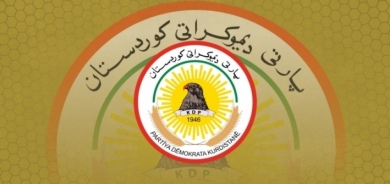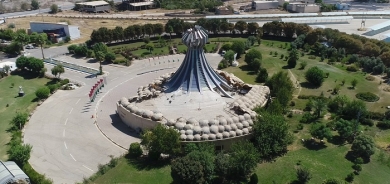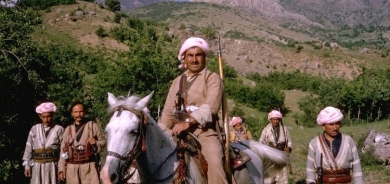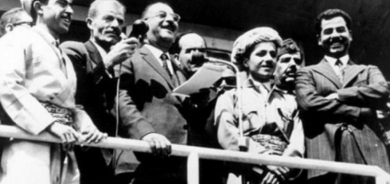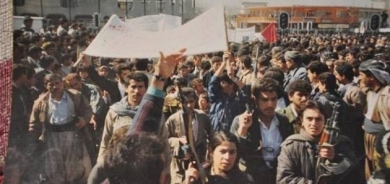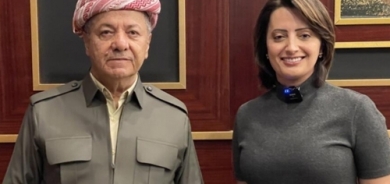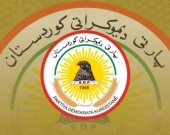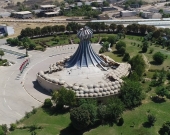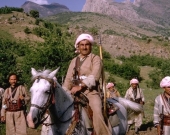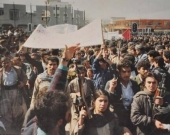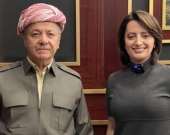The Effects of Media in the Transitional Stages
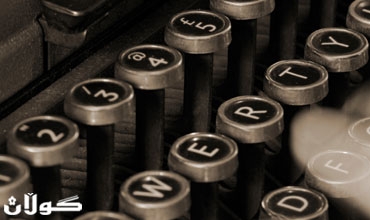
((The professional media believes in the standards of professional journalism, which are: accuracy and fairness. And also; Professional media do no make up facts or stories; they try to report facts within their context, and not out of the context. Professional media also are fair, they try to make sure that the evidence they have of wrongdoings or abuse of power is well-documented, and not told by others. So; the responsible reporting is an evidence-based journalism, because responsible journalism relies more on the facts. Publishing false information damages the credibility of the media. That’s why; if you keep reporting inaccurate news, then your credibility will suffer and people will no longer believe what you write.)) Sheila Coronel
******
“Pravda” and “Izvistia”; which mean: (Truth and News), are the names of two Russian ancient newspapers, the first one founded in 1912 and Lenin was one of the founders, and the latter founded in 1917, both still operating up to the day. During the Soviet Union era Pravda was the soviet communist party’s organ, while Izvistia was operating as a daily newspaper of the Soviet State. That’s to say; since 1917 up to 1991, which makes it 74 years; these two newspapers were the communist society’s newspapers where they had no faith in free media. But after 1991 and up to the day, the operating method of these two newspapers witnessed change in such a way that they are trying to fit themselves with free journalism standards. The Professor Dusan Rilchek, a supreme researcher in the European Institute for Media (the EIM), in a research under the title (Civil Society, Mass Media, and Democracy in the Post-Communist Countries) regarding to the role of media in the transitional stages and its features, the professor Rilchek asserts that; the process of the transitional stage has an open end, we can’t realize where the combination structure of the society under the old mentality from the communist era are driving them, and we don’t know how the changes would be. But; what we know is that, the majority of the population will not let the old close-minded situation to be built again under a different name. Regarding to the role of media and its effects in such delicate situations, the Professor Rilchek mentions that; it is true that the majority of the population don’t want the media of the transitional stages to be a (CNN), but they also don’t want Pravda and Izvistia to be the same soviet’s old newspapers. The Professor Rilchek makes a pause on the name of both newspapers; Pravda (Truth) and Izvistia (News), he wrote in this respect that; the Russians refuse pravda without izvistia and refuse izvistia without pravda, in other words; the Russians refuse truth without news and news without truth as well. Therefore; in one of his researches he says that the people of the transitional stages don’t ask the media to enlighten them; they rather ask media not to report false and misinformed news. Thus; this research is telling us that the main problem in the democracy development process in the post-communist and the American Latin countries, which lead to have different types of democracies, is the different operating methods of journalism and the level of commitment to the professional journalism standards.
The Risks of Misinformation upon Democracy
When the talks comes to the authority of journalism, there is a common view among political and social researchers and scientists, they think that media has an important and a vital role in determining the fate of democracy in any given democracy all around the world. Meaning; the conditions for building democracy differs from one place to another and is changeable from one society to another, but the role of democracy in the democracy building process is that fixed element that no democracy can undermines it. So; we are not arguing here the effects of media in the democracy development process only, we rather argue; how journalism can play this important role in that historical and delicate situation? Regarding to this topic; political and social scientists and researchers, even media schools as well; strongly think that the role of journalism in democracy development does not have great attention yet, and the researches which pay attention to the role of media in the developing countries is not that much, or it doesn’t got attention as necessary. And that’s the reason why all the amounts of money spent by the Western European countries and the United States in supporting media in the post-communist and the developing countries does not achieve the expected results as a professional journalism should obtain in that important stage. Regarding to the results gained by journalism in such societies, the Professor Rilchek says; in such countries, media and democracy look like two trains moving in opposite directions and never meet in any point. Regarding to the effects of the credibility of media, we asked the Professor Emily Bell, the Head of Guardian Digital Center in Britain and professor of Practical Media in Colombia University, in this respect; the professor Bell replied to our questions in an exclusive interview to Gulan Magazine and she said: (I think in any democracy, you have to have an independent credited of how that democracy performs. So; the role of the press is absolutely vital and maintaining that. The moment you have a journalistic function or a press which is tied to only telling one side of the story, or strict from telling all sides of the story, then your democracy is not fully functional. To know what a good professional press is; I think there are whole ranges of ways, there two or three things which are fairly easy to identify; first of all: if the professional press have accountability, in other words; it can be held accountable for the things it put into the public. If it is not producing accurate information, and if it not using illegal method for reporting, if it is not fake, meaning; transparency of professional media; who is the writer, who is the editor, whose the owner, and how it operates; I think that is important in professional press. In spite of understanding both legal and ethical boundaries in publishing, and also to balance the issues of public interests and against rule which might restrict those, and thinking carefully about what responsible publishing is. In other words; making sure that things they report or publish are not deliberately harmful and not slanders or malicious lies, and making sure that you are not unnecessarily invading people’s privacy when you don’t really have a public interests defend for it, understanding the balance between the responsibilities to report things that people don’t want you to report. So; what a functioning professional press looks like is; it looks transparent and so realistic, in other words; it looks accountable.)
Accordingly; the conditions put for media and the used ones in the United States are all journalism’s code of ethics, and professional journalists have assigned that ethical code for the journalism function. Regarding to this topic, we asked the professor Ann Cooper, who worked for 25 years as a reporter for radio stations and newspapers in the United States, and now is a professor of Media in Colombia University, in an exclusive interview to Gulan Magazine; she replied as the following: (The media obviously have to build a culture of ethical practices. The most important thing that media should have is integrity; deliberately publishing false information is going to put you out of the business very quickly. It can’t call on audience if you don’t have credibility. So that means, when you do a mistake, we all do at some points; the journalist should be willing to acknowledge that quickly and publicly. And if you don’t do that; overtime there not going to have audience, because people will recognize it as; this is not a media that can be relied upon to tell us the truth. Many funders who try to build independent media in transitional countries, on of the things they fund are sort of teaching ethical models encouraging individual media outlets to adopt their ethic’s code. Billions of Dollars have been spent by Western Governments on training journalists in post-communist countries and other countries where there is some form of transition to democracy. I think there is a lot of idealism naivety in early days, the trainers been paying much attention to the fact that you can train great journalists that if media outlet make a go of it financially, then it all collapses. So; there have been a lot of emphases in training in business practices and how to make a media outlet profitable, or at least make enough money so that they cab pay its journalists a decent wage. But it is tough, I mean; in the western countries right now media themselves are suffering a lot of financial hardship. For example in the Former Soviet Union or the Eastern Europe right after communism collapsed, there wasn’t any advertising, and that’s the backbone of the financial support for Western media in many countries. So; there was a time when advertising has grown as an important source of finance in those countries. So again; it is the process that figuring out in each country what can be used to try to make a financial resource, so that you don’t end up with a media completely relying on one political party or one rich billionaire. That’s what you really will avoid. Try to find a financial model so that the media are not control by just a handful of people who would use them to enhance their own political views.)
BBC Funded by Taxpayers
The BBC use to be mention in the developing or the post-communist countries as a governmental broadcasted channel. Since this organization is funded by the government, in this respect; there are talks that it is possible to establish a media organization, similar to the BBC, funded by the government and operate freely. Therefore; the main question at this point is; can a media organization funded by the government be free? In response; many believe that in countries where free media can be provided, then all media organizations will be obliged to operate freely, because if they don’t act freely, then they will loose their credibility. And examples for this, the media in transitional countries where they assume they been working freely, yet they rather were the reason of why people lost their faith in media, or reached a point when people called that they no longer need media. In this respect; and regarding to the distortion of media in such countries, the Professor Sheila Coronel, the Head of Toni Stabile Center for Journalistic Investigations replied to Gulan Magazine in an exclusive interview and said: (It is true that after the collapse of a dictatorship or an authoritarian rule there is a freedom for all; everybody wants to say something and everybody wants to set a newspaper, radio station, or a website. That is part of what democracy brings about, and the downside you have more sensational news reporting, people are expressing opinions without bases, and divisions rather that consensus within society. In a situation like this, you need a community of professional journalists, who will assert the standards of professional journalism, and assert the need of journalism within the society. The press alone can not do it by itself, you need a community to support free and independent press, and you need regulations, rule of law, you need laws and judges who will decide in favor of journalists who are responsible. You need to have media owners, publishers, and owners of broadcasting who will prefer to do responsible journalism and promote a journalism that is good for the society, and tries to achieve consensus rather than division within the society. Journalism that promote debate rather than acrimony or senseless discussion, journalism that attempts to reflect the values of the society. And also; a professional media, for example, believe in the standards of professional journalism, which are: accuracy and fairness. Professional media do no make up facts and they do not make up stories, they try to report facts within contexts, and not out of their contexts. Professional media also are fair, they try to make sure that the evidence they have of wrongdoings or abuse of power is well-documented, and not told by others. So; the responsible reporting is an evidence-based journalism, because responsible journalism relies more on the facts. Publishing false information damages the credibility of the media. That’s why; if you keep report inaccurate news, then your credibility will suffer and people will no longer believe what you write.)
The Professor Coronel mentioned that the opening of transitional stage has negative and positive aspects, but what increases the negative aspect is that either the journalist are not committed to the journalism as a profession or they ignore the professional journalism standards. To go further and deeper into this subject, we interviewed the Professor Daren C. Braham, professor of Journalism in Oita University, he expressed his view to Gulan Magazine as the following; he said: (I think there are a lot of journalistic principles that happen in some of these large comprehended media entities. I agree with you that media organizations have to sustain themselves in order to remain truthful and do the best in journalism, but there is a line between an independent news organization that’s free, that operate more than on non-profit bases, or is really adhering to the principles of good journalism, there is a big difference between those organizations and large corporate media which are more in the business of entertainment. There are great examples of news organizations; I think Fox News is a bad example, or any major US media. I think it is important for the individuals that actually do the reporting and run these news organizations to have a strong personal conviction with news, and an allegiance to these normative ethical principles of journalism that businessmen don’t have. I think you end up with problems when you look at editors of newspapers that don’t actually have a kind of journalism experience, but they are businessmen. And I think you just see kind of this managerial business framework at the top of these organizations encroaches downward into the very daily operations of journalists. And that can happen actively or can happen passively if you layoff journalists, you stress them such things and they don’t have time to do journalism. Therefore; when an organization publishes false information, for whatever purposes, I think that undermines the credibility of that news organization tremendously, and it jeopardizes the principle of free media in the democratic society. There is a line between bias and misinformation though, in my opinion all news organizations are inherently biased because people and inherently biased. But you look at organization, like The Fox News for instance; that is so biased that they failed to present the other side or they distort what the other side said, I think misinformation, lying, and deception harms the whole image of the U.S. media and it shake people’s faith in good journalism and it undermines the credibility of the other organizations.)
What the Professor Braham mentioned was the distortion of the journalism image and non-showing all the sides of the story. Regarding to how the BBC is a government funded channel and operates freely, the Professor Emily Bell who’s from Britain and is familiar with the way the BBC operates, and during her comments to Gulan Magazine, she mentioned that; it is true that the government is providing funds for the BBC, but that fund is from the taxpayers and is separate from the general taxation, the professor Bell said: (If media is an extension of the political parties, then there is not full transparency around democratic process. I come from a country where it is not a state funded but a tax funded, publically funded broadcasted BBC, is a key provider of journalism. If you say in America that the people are funding the BBC, I think a lot of journalists would be disturbed by the idea that you have taxpayers funding, it is culturally in the UK that we pay for this media, yes it is through taxation mechanisms but it is separate from the treasury and is not part of the general taxation. There are a lot of these kinds of boundaries which we culturally feel that the BBC is independent, but it is more actually culturally held that stand rather than by rules. It is the people who gave that very importance for BBC to see it journalistically independent. What you are talking about is; how to get a functioning media which stands separately from government, that’s going to be hard, and it is going to be harder because in most of the developing democracies there is traditionally also a problem that media which is commercially supported in some way is also likely to be highly favorable to the existing regime. So; deciding when something is fully commercially free and also politically free is difficult.)
******
Headlines:
Emily Bell to Gulan Magazine:
The Professional Press has to be held accountable for the things it put into the public, and it should not use illegal methods for reporting, it should be transparent and so realistic
Ann Cooper to Gulan Magazine:
The most important thing that media should have is integrity. When you do a mistake, we all do at some points; the journalist should be willing to acknowledge that quickly and publicly
Sheila Coronel to Gulan Magazine:
In transitional stages, we need a community of professional journalists who will assert the standards of professional journalism, and assert the need of journalism within the society
Daren C. Braham to Gulan Magazine:
It is important for the individuals that actually do the reporting and run these news organizations to have a strong personal conviction with news, and an allegiance to these normative ethical principles of journalism.
Translation and transcription: Qane Kakeiy

